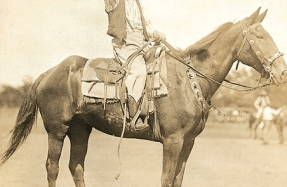HUNTING BIG BEAR

It was a desperate, weary band of Wood Crees who paused with their white hostages at Loon Lake, Saskatchewan, on the morning of June 3, 1885. Little more than two months had passed since they and their nominal chief, Big Bear, had petitioned Canadian government officials for promised rations in exchange for having abandoned their nomadic, hunter-gatherer lifestyle. The rations had not come, and the First Nations had gone starving. Since then, the band had acted rashly on their rancor in a spate of brutal killings at Frog Lake that whites were calling the worst atrocity of the North-West Rebellion—the larger conflict in which, by intent or not, they were embroiled. Since then the Wood Crees had been mostly on the run, having managed to shake off the Canadian army force pursuing them. They had had less success, however, eluding the more persistent foes who followed close behind—the North-West Mounted Police (NWMP), aka the “Mounties.” Before the day was out, the adversaries would square off.
The clash at Loon Lake was only tangentially related to the larger conflict to which it had become the tailpiece. The North-West Rebellion of 1885, the largest and bloodiest uprising in the history of Canada’s western expansion, lacked the ferocity of like conflicts in the United States, but it incorporated human dramas similar in nature to those of its southern neighbor. The principal antagonists were the government in Ottawa and a provisional breakaway government established on March 19 at Batoche, Saskatchewan, by the half-blood Métis people, led by Louis David Riel.
Whereas the Métis were fighting for their land
You’re reading a preview, subscribe to read more.
Start your free 30 days





